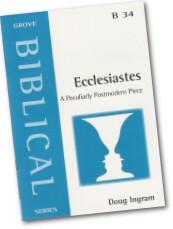
Ecclesiastes has, from the very beginning, been read in quite opposite ways - as a book of joy, with overtones of realism, and as a book of scepticism despite hints of joy.
Where does this ambiguity come from? Is it in the minds of readers - or actually in the text itself? If so, what does this imply for how we read Scripture, how we interpret Christian living - and even for how we make the gospel known in a postmodern context?
Where does this ambiguity come from? Is it in the minds of readers - or actually in the text itself? If so, what does this imply for how we read Scripture, how we interpret Christian living - and even for how we make the gospel known in a postmodern context?


